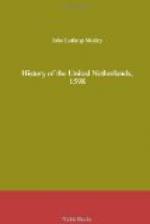Certainly it was fair enough for the queen and her, counsellors to stand out for an equitable arrangement of the debt; but there was much to dispute in the figures. When was ever an account of fifteen years’ standing adjusted, whether between nations or individuals, without much wrangling? Meantime her Majesty held excellent security in two thriving and most important Netherland cities. But had the States consented to re-establish the Spanish authority over the whole of their little Protestant republic, was there an English child so ignorant of arithmetic or of history as not to see how vast would be the peril, and how incalculable the expense, thus caused to England?
Yet besides the Cecils and the lord high admiral, other less influential counsellors of the crown—even the upright and accomplished Buckhurst, who had so often proved his friendship for the States—were in favour of negotiation. There were many conferences with meagre results. The Englishmen urged that the time had come for the States to repay the queen’s advances, to relieve her from future subsidies, to assume the payment of the garrisons in the cautionary towns, and to furnish a force in defence of England when attacked. Such was the condition of the kingdom, they said—being, as it was, entirely without fortified cities— that a single battle would imperil the whole realm, so that it was necessary to keep the enemy out of it altogether.
These arguments were not unreasonable, but the inference was surely illogical. The special envoys from the republic had not been instructed to treat about the debt. This had been the subject of perpetual negotiation. It was discussed almost every day by the queen’s commissioners at the Hague and by the States’ resident minister at London. Olden-Barneveld and the admiral had been sent forth by the Staten in what in those days was considered great haste to prevent a conclusion of a treaty between their two allies and the common enemy. They had been too late in France, and now, on arriving in England, they found that government steadily drifting towards what seemed the hopeless shipwreck of a general peace.
What must have been the grief of Olden-Barneveld when he heard from the lips of the enlightened Buckhurst that the treaty of 1585 had been arranged to expire—according to the original limitation—with a peace, and that as the States could now make peace and did not choose to do so, her Majesty must be considered as relieved from her contract of alliance, and as justified in demanding repayment of her advances!
To this perfidious suggestion what could the States’ envoy reply but that as a peace such as the treaty of 1585 presupposed—to wit, with security for the Protestant religion and for the laws and liberties of the provinces—was impossible, should the States now treat with the king or the cardinal?




